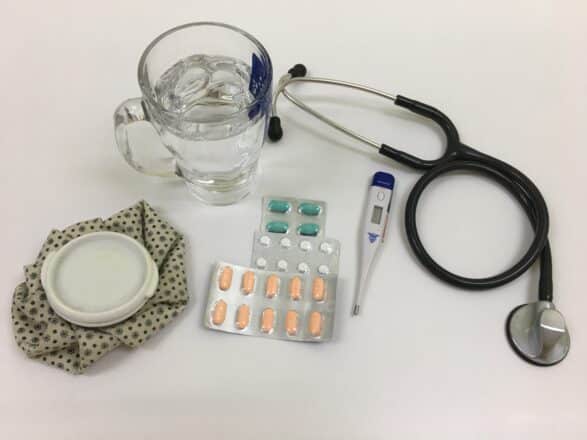Navigating the complexities of medication management becomes increasingly critical as we age, with changes in our bodies influencing how we react to medicines and heightening the risk of drug interactions. In “The Guide for Aging Adults: Effective Medication Management,” you’ll discover key insights about the varied types of drug interactions – drug-drug, drug-condition, drug-food, and drug-alcohol, each carrying the potential for undesirable side effects and impacting the potency of your medication. You’ll be enlightened on the importance of vigilantly tracking those side effects, no matter how minor, and escalating them to your healthcare provider. It emphasizes the necessity of open dialogue with healthcare professionals regarding your medical history and lifestyle, including the challenges you might be facing in administering your medication. Included also are guidelines on effectively communicating with pharmacists about your prescriptions to avoid harmful interactions and learn more about your medication. You’ll learn why it’s crucial to ask probing questions about your new prescriptions to your doctors and pharmacists to better understand administration procedures, effectiveness, potential setbacks, and necessary precautions.

Understanding the Impact of Aging on Medication Use
Taking medications is quite a common part of many people’s daily lives, especially as they grow older. Understanding how aging can impact the way your body reacts to drugs can be crucial in ensuring that you’re using your medication safely and effectively.
Effects of Aging on the Body
As you age, your body goes through several significant changes that can affect the way it responds to medication. For instance, your metabolism slows down, resulting in slower breakdown and elimination of drugs. Older people may also have decrease in kidney and liver function compared to younger individuals. This means that drugs may stay in your system for longer periods, potentially leading to adverse effects or toxicity.
Changes in Medicine Reaction Due to Aging
Increased sensitivity to drugs, a common occurrence in the elderly, often means that smaller doses are needed to achieve the desired effect. This increased sensitivity also expands the possibility of experiencing side effects, as the standard dose for an adult could potentially be harmful for an older person. Therefore, appropriate dose adjustments must be made to ensure effective and safe drug therapy.
The Risk of Increased Drug Interactions with Aging
The risk of drug interactions also increases with age mainly due to the higher number of medications taken. The more medications you are on, the greater the chance that two or more of them could interact and lead to adverse effects.
Different Types of Drug Interactions and Their Effects
Understanding the different types of drug interactions can help manage your medication routine more effectively and avoid potential complications.
Understanding Drug-Drug Interactions
Drug-drug interactions occur when two or more drugs react with each other, causing an increase or decrease in the effectiveness of one or more of the medications, or potentially causing adverse side effects that weren’t present when the drugs were taken individually.
Insight into Drug-Condition Interactions
Drug-condition interactions occur when a pre-existing medical condition makes certain drugs potentially harmful. If you have specific health conditions, such as high blood pressure or diabetes, some drugs may trigger symptoms or worsen your condition.
Review of Drug-Food Interactions
Drug-food interactions happen when drugs and food alter each other’s effectiveness. Some foods can affect the absorption of certain medications, leading to either an increase or decrease in the drug’s effect.
Impact of Drug-Alcohol Interactions
Alcohol can interact with certain medications and result in harmful effects. For example, mixing alcohol with some drugs may cause nausea, headaches, and loss of coordination, among other symptoms.
Recognizing and Managing Side Effects of Medicines
Understanding the side effects of medicines and how to deal with them can significantly improve your medication use.
Grasping the Range of Potential Medicine Side Effects
Every medicine carries the potential for side effects, which can range from minor nuisances, such as dry mouth or sleepiness, to more severe and potentially life-threatening reactions such as breathing difficulties or heart problems.
Tracking Side Effects Effectively
Having a system for tracking medication side effects can help you recognize patterns and report changes to your healthcare provider. This might include keeping a journal or diary detailing when you take your medication, any side effects you notice, and how severe they are.
The Importance of Reporting Side Effects Promptly
If you experience any side effects, you must promptly report them to your healthcare professional. Early reporting can help avoid any serious complications and help your healthcare provider adjust your treatment if necessary.
Importance of Regular Communication with Healthcare Professionals
Regular check-ins and communication with your healthcare professional are vital in managing your medication effectively.
Discussing Medical History
Your medical history, including previous and current medical conditions, surgeries or treatments, could be crucial information in assessing your medication plan.
Sharing Eating Habits
Your dietary habits can significantly impact how your body processes medicines. For instance, grapefruit can affect the potency of certain drugs, while dairy products might inhibit the absorption of some antibiotics.
Addressing Difficulties with Medicine Administration
If you’re having trouble taking your medication, don’t hesitate to discuss it with your healthcare provider. They can offer alternatives or solutions like easier-to-open containers, larger labels for those with vision problems, or liquid forms of medication for those who have trouble swallowing pills.

Providing Complete Medication Information to Healthcare Professionals
Sharing complete information about your medication with your healthcare providers can help them manage your health more effectively.
Importance of Complete Drug Disclosure
It’s important to disclose all the medications you’re taking, including prescription drugs, over-the-counter medicine, dietary supplements, and herbal products. This information can help your healthcare provider identify potential drug interactions and adjust dosages accordingly.
Risks Associated with Incomplete Drug Information
Inaccurate or incomplete drug information can lead to harmful drug interactions, adverse side effects, and reduced efficacy of your medication.
How to Compile a Comprehensive List of all Medication Being Used
Creating a comprehensive list of all your medications, including the drug’s name, strength, and frequency, can help ensure safety and effectiveness. Always remember to update this list whenever there’s a change in your medication or dosage.
Role of Pharmacists in Effective Medication Management
Pharmacists are essential players in healthcare and can greatly assist you in managing and understanding your medications effectively.
How Pharmacists Can Assist in Understanding Medication
Pharmacists are trained to understand how medications work. They can explain your medications, their purpose, and how they might interact with other drugs. They can guide you on the proper timing and method of taking your drugs to maximize effectiveness and minimize unwanted side effects.
Explaining Potential Side Effects and Harmful Interactions
Your pharmacist can also provide you with information regarding potential side effects and harmful interactions among the medications you’re taking.
Understanding Labels and Written Information on Medicines
Pharmacists can also assist in understanding labels and instructions on your medication. They can provide guidance on interpreting terms and following directions which can ultimately help ensure you’re using your medication appropriately.

Key Questions to Ask Your Doctor and Pharmacist
To fully grasp your medication regimen, it’s crucial to ask your healthcare providers the right questions.
Questions about New Prescriptions
When you are prescribed a new medication, inquire about its purpose, possible side effects, and whether it might interact with your current medications.
Understanding Medication Administration
Clarify how best to take your medication for maximum efficacy. Ask about timing, whether it should be taken with or without food, and anything else specific to the drug.
Clarifying Medication Effectiveness
Ask about how to judge if your medication is working or not, and how long it might take to start noticing improvements.
Addressing Potential Challenges with New Medications
If you’re concerned about the cost of a new medication or how it might impact your daily life, talk to your healthcare professional. They can provide guidance and might be able to suggest alternatives or solutions.
Importance of Understanding Precautions
Inquire about precautions with your medication, such as foods, beverages, or activities to avoid while on the medication.
Creating a Personalized Medication Schedule
Creating a personalized medication schedule can help you maintain consistency and avoid missing doses.
Need for a Personalized Medication Schedule
A personalized medication schedule can assist in ensuring you’re taking your medication appropriately. It can also help prevent skipped doses, which can affect the effectiveness of your medication.
Factors to Consider While Designing a Medication Schedule
Your schedule should be designed to fit your lifestyle, considering your daily activities and responsibilities. Determine the most appropriate times for taking your medicines, matching these with regular activities like meals or bedtime.
Methods to Stick to Your Medication Schedule
Reminders can be a great help to stick to your medication schedule. Use tools like alarms, phone apps, or a paper-based system to remind you of your medication timings.
Understanding Over-the-Counter Medications and Supplements
Not all medications require a prescription. Understanding over-the-counter (OTC) medications and supplements can ensure informed decisions about your healthcare.
Determining the Safety & Efficacy of Over-The-Counter Medications
Just like prescription drugs, OTC medicines can have side effects and interactions. Therefore, be sure to discuss any OTC drugs you’re planning to use with your healthcare provider to ensure they’re safe and effective for you.
Knowing the Potential Interactions of Supplements
Dietary supplements, including vitamins and minerals, can interact with your prescription medications. Be sure to inform your healthcare provider about any supplements you are taking or plan to take.
Discussing Over-The-Counter Medications and Supplements with Healthcare Professionals
Your healthcare professional can provide guidance on OTC medications or supplements, including potential interactions, side effects, and optimal usage.
Safeguarding Against Medication Errors and Misuse
Medication errors and misuse can lead to serious health complications. It’s essential to stay vigilant and take steps to avoid these situations.
Common Types of Medication Errors
Common medication errors include taking the wrong medication, taking the wrong dose, or taking medication at the wrong time. Ensuring understanding and adherence to your medication schedule can safeguard against these errors.
Strategies to Avoid Medication Misuse
Always follow your healthcare provider’s instructions about how and when to take your medication. Do not share your medication with others and do not take anyone else’s medication.
Steps to Take in Case of Suspected Medication Errors or Misuse
If you suspect a medication error or misuse, reach out to your healthcare provider immediately. They can provide guidance on the next steps to take and how to manage any potential side effects or adverse reactions.
To sum it up, aging could affect your body’s reaction to medications and thereby increase chances of drug interactions. Understanding the types of drug interactions, managing side effects, regular communication with healthcare professionals, and proper reporting are key elements to safe medication use. Pharmacists play a critical role in medication management, offering important insights on medication use, side effects, drug interactions, and clarifications on your medication labels. Asking pertinent questions to your healthcare professionals, maintaining an effective personalized medication schedule, understanding over-the-counter medications and supplements, and safeguarding against medication errors and misuse are essential aspects to discuss for comprehensive information on medication use.
